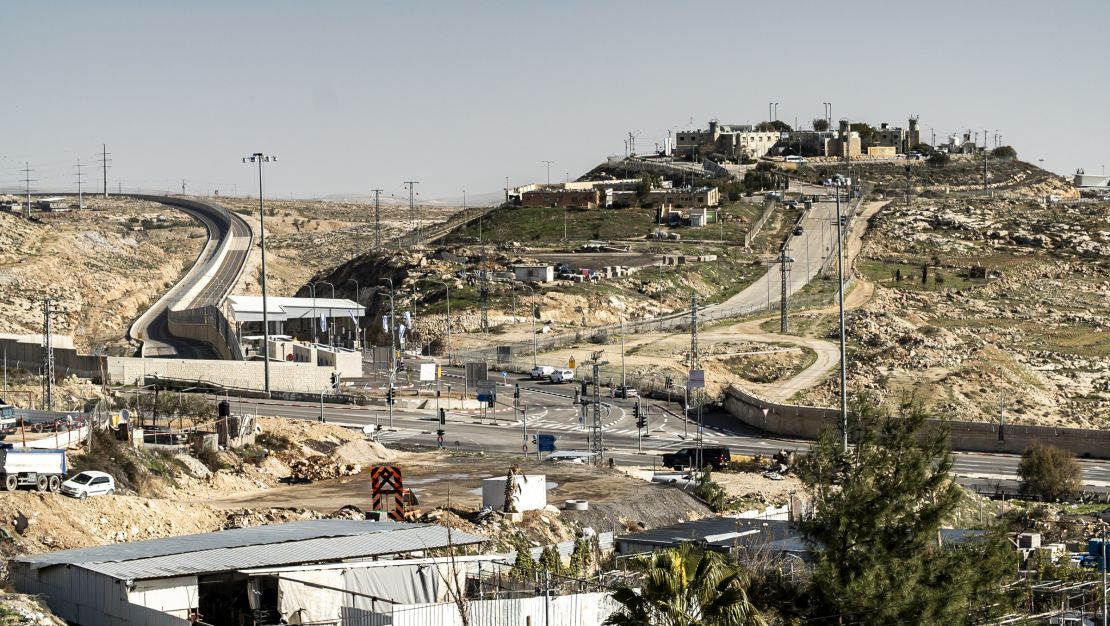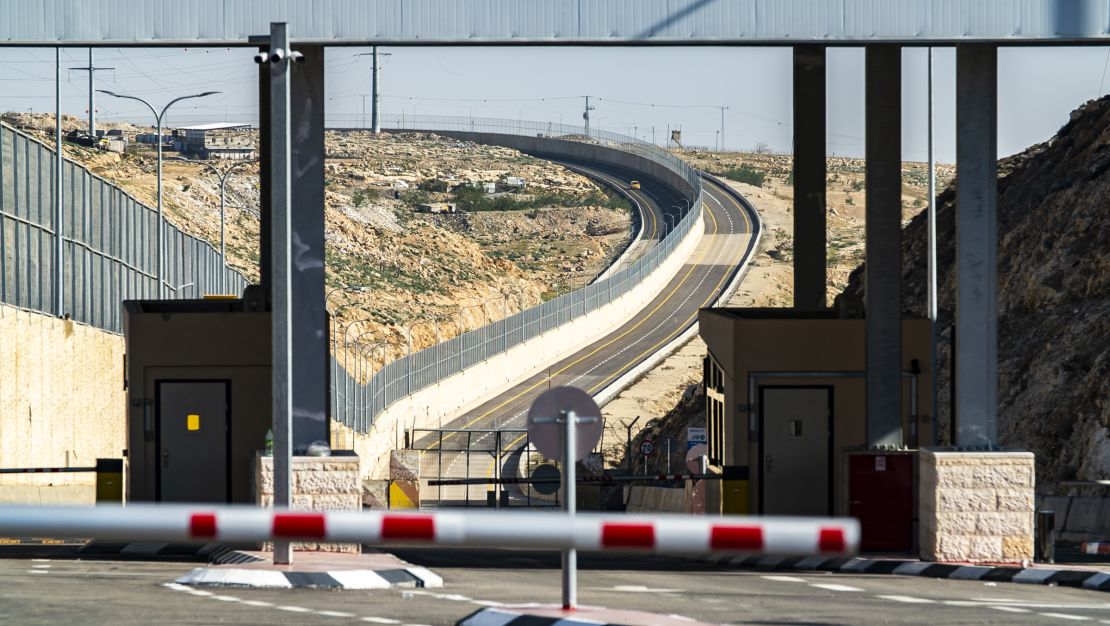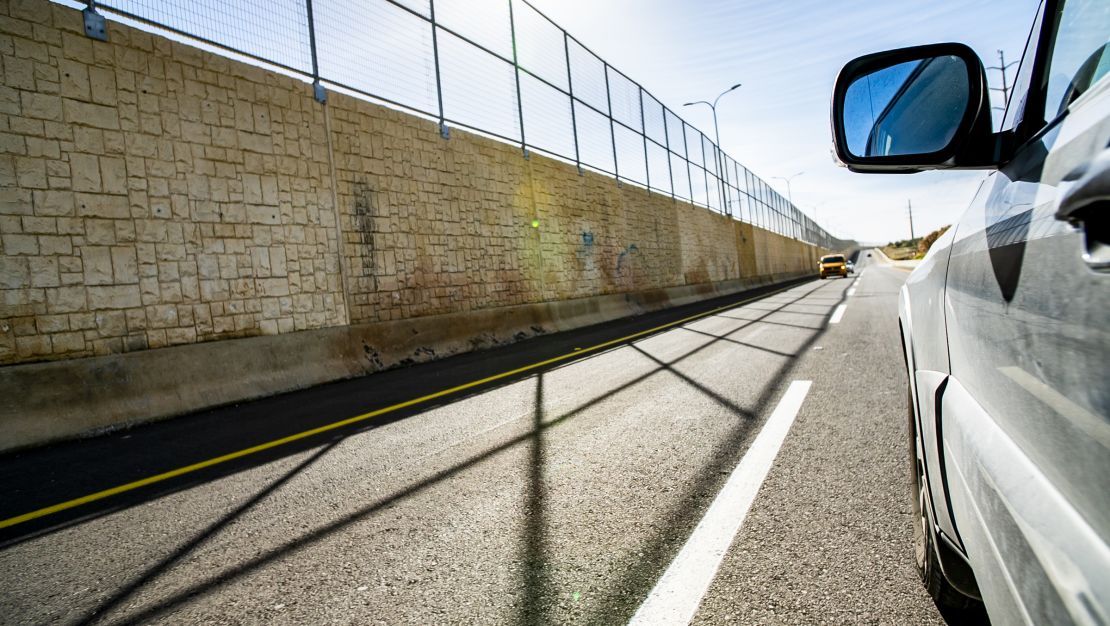The newest road in the West Bank is sparking controversy. Designed to ease traffic between Jerusalem and nearby settlements, it looks and feels like any other road. Israeli officials call it Route 4370, but its detractors have another name for it: “apartheid road.”
The road, which runs north-south, is actually two parallel roads separated by an 8-meter (approximately 26 feet) concrete wall topped with metal fencing. The western half is designed for Palestinians, though it can be used by anyone, and it bypasses Jerusalem; the eastern half is for Israelis, and anyone else with a legal permit to enter Jerusalem.
Israeli officials say the western road will alleviate Palestinian congestion in the area by connecting traffic from north of Jerusalem towards east and south, without requiring drivers to pass through checkpoints around Jerusalem.
Israel’s transportation minister, Israel Katz, praised the project after years of delays. He called the opening of the road “an important step in connecting the residents of Binyamin Region to Jerusalem, and in strengthening Jerusalem.”
Binyamin Region is an area in the West Bank home to 72,000 Israeli settlers.

Under international law, Israeli settlements in the West Bank, and the presence of settlers there, is considered illegal because the international community – through repeated United Nations Security Council resolutions – has declared the West Bank, along with Gaza and East Jerusalem, to be occupied territory, though Israel disputes that characterization.
The new road drew sharp criticism from Palestinian officials who said the situation in the West Bank bore similarities to apartheid-era South Africa.
“The creation of this new apartheid road affirms Israel’s willful intent to entrench its racist colonial regime and superimpose ‘Greater Israel’ on all of historic Palestine,” Palestine Liberation Organization (PLO) Executive Committee member Hanan Ashrawi said in a statement.
“With the blanket support of the current US administration, including endorsement of Israel’s egregious violations and total disdain for international law and the global consensus, Israel is successfully destroying the territorial contiguity and territorial integrity the West Bank (including East Jerusalem) to enhance its colonial settlement enterprise and facilitate the creation of Bantustans throughout occupied Palestine.”
“Bantustans,” or homelands, as they were often referred to, were lands allotted to non-white South Africans by the apartheid-era government to separate them from the white population. Non-whites had to use passbooks, a kind of passport, to travel into designated white areas. The homelands for non-whites were only a small percentage of the total land.

Israeli officials reject those comparisons.
They say the two roads, which are open to Palestinians and Israelis alike – as long as they have the right paperwork – is more about functionality than separation.
“The claim that this is an apartheid road is complete nonsense. Apartheid is discrimination based on ethnic and racial background,” Israel Gantz, head of the Benyamin Regional Council, told CNN.
“The entry to Jerusalem through the (eastern) road is allowed to all those who have a legal entry permit, regardless of their nationality, religion, ethnic or racial background.”
All Israelis, regardless of background or religion, can pass freely in and out of Israel, while Palestinians from the West Bank need special permits issued by Israeli authorities.
Currently, the roughly 3.5-kilometer (approximately 2.2-mile) eastern road connecting Jerusalem to nearby settlements is open from 5 a.m. to 12 p.m., Sunday to Thursday, but authorities say they plan to have it open round the clock in the future. The 5-kilometer (approximately 3.1-mile) western road for Palestinians is already open any time of the day.
But Israeli officials are clear that the road is not just about facilitating better traffic flow. It is also meant to reinforce Israel’s hold over parts of the West Bank.

“This is one move of many to strengthen the services of the ministry to residents of Judea and Samaria, and to the strengthening of sovereignty in the region,” Minister of Public Security Gilad Erdan said at the opening ceremony, using the biblical terms for the West Bank. “The road that was opened today is an example of how we can create mutual life between Israelis and Palestinians, while at the same time safeguarding all the existing security challenges.”
Palestinian officials regard this “strengthening of sovereignty” as a further obstacle in the way of a future two-state peace deal with Israel; the construction of roads and walls further entrenching Israel’s settlements around Jerusalem and in the West Bank.
“Israel wants to give Palestinians transportation contiguity rather than territorial contiguity,” Fouad Hallaq, a senior adviser to the PLO, told CNN. “They want to create an infrastructure program to further isolate Jerusalem from the rest of the Palestinian territories, and isolate Palestinians within Jerusalem while facilitating the movement of settlers.”
“It makes it more difficult to reach a final status agreement when you add these layers, the walls and Israeli-only roads that Israel is adding on the ground,” he said.
